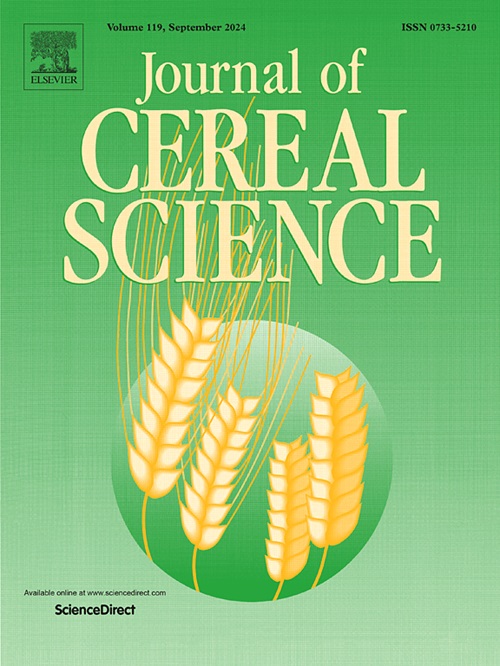Effect of moisture preconditioning on maize (Zea mays L.) kernel behavior and tortilla quality under reduced-time alkaline cooking
IF 3.7
2区 农林科学
Q2 FOOD SCIENCE & TECHNOLOGY
引用次数: 0
Abstract
This study investigates the impact of maize moisture content—achieved through soaking—on starch functionality, cooking behavior, and tortilla quality. The research focuses on how varying pre-soaking times alter the hydration state of maize kernels and influence physicochemical and molecular transformations during lime cooking, offering insight into strategies for reducing energy and time in traditional tortilla processing. White maize kernels were soaked for up to 32 h, with 12 h being chosen for achieving moisture levels (∼38.6 %) conducive to efficient cooking. When cooked for 15 min in alkaline conditions, these pre-soaked kernels reached 49.7 % final moisture content more rapidly than unsoaked controls. This hydration difference significantly affected starch behavior: pre-soaked samples exhibited lower gelatinization temperatures and enthalpy, greater swelling capacity, and higher levels of rapidly digestible starch. Molecular analysis revealed reductions in starch molecular weight and radius of gyration, suggesting partial depolymerization. Tortillas produced from pre-soaked maize demonstrated higher initial softness and extensibility, attributed to enhanced starch gelatinization. However, they also exhibited greater firmness after 3 days of storage due to accelerated retrogradation, highlighting a trade-off between immediate texture quality and shelf stability. Moisture content was a key determinant in these outcomes, reinforcing the central role of water availability in thermal and structural transitions. These findings suggest that pre-soaking maize before cooking is a viable strategy for modulating processing outcomes, reducing cooking time, and tailoring textural properties. Reframing traditional nixtamalization through moisture optimization offers new pathways for improving product quality and energy efficiency in maize-based food systems.
水分预处理对玉米(Zea mays L.)仁在缩短时间的碱性蒸煮条件下的行为和玉米饼质量的影响
本研究探讨了通过浸泡获得的玉米水分含量对淀粉功能、烹饪行为和玉米饼质量的影响。研究重点是不同的预浸泡时间如何改变玉米籽粒的水化状态,并影响石灰烹饪过程中的物理化学和分子转化,为传统玉米粉圆饼加工中减少能量和时间的策略提供见解。白玉米粒浸泡32小时,选择12小时以达到有利于有效烹饪的水分水平(~ 38.6%)。当在碱性条件下煮15分钟时,这些预浸泡的谷粒比未浸泡的谷粒更快地达到49.7%的最终水分含量。这种水化差异显著影响了淀粉的行为:预浸泡的样品表现出较低的糊化温度和焓,较大的膨胀能力和较高的快速消化淀粉水平。分子分析显示淀粉分子量和旋转半径减少,表明部分解聚。由预浸泡玉米制成的玉米饼表现出更高的初始柔软性和延展性,这是由于淀粉糊化的增强。然而,由于加速退化,它们在储存3天后也表现出更大的硬度,突出了即时质地质量和货架稳定性之间的权衡。水分含量是这些结果的关键决定因素,加强了水分在热和结构转变中的核心作用。这些发现表明,在烹饪前预先浸泡玉米是一种可行的策略,可以调节加工结果、缩短烹饪时间和调整质地特性。通过水分优化来重构传统的湿度化,为提高玉米食品系统的产品质量和能源效率提供了新的途径。
本文章由计算机程序翻译,如有差异,请以英文原文为准。
求助全文
约1分钟内获得全文
求助全文
来源期刊

Journal of Cereal Science
工程技术-食品科技
CiteScore
7.80
自引率
2.60%
发文量
163
审稿时长
38 days
期刊介绍:
The Journal of Cereal Science was established in 1983 to provide an International forum for the publication of original research papers of high standing covering all aspects of cereal science related to the functional and nutritional quality of cereal grains (true cereals - members of the Poaceae family and starchy pseudocereals - members of the Amaranthaceae, Chenopodiaceae and Polygonaceae families) and their products, in relation to the cereals used. The journal also publishes concise and critical review articles appraising the status and future directions of specific areas of cereal science and short communications that present news of important advances in research. The journal aims at topicality and at providing comprehensive coverage of progress in the field.
 求助内容:
求助内容: 应助结果提醒方式:
应助结果提醒方式:


